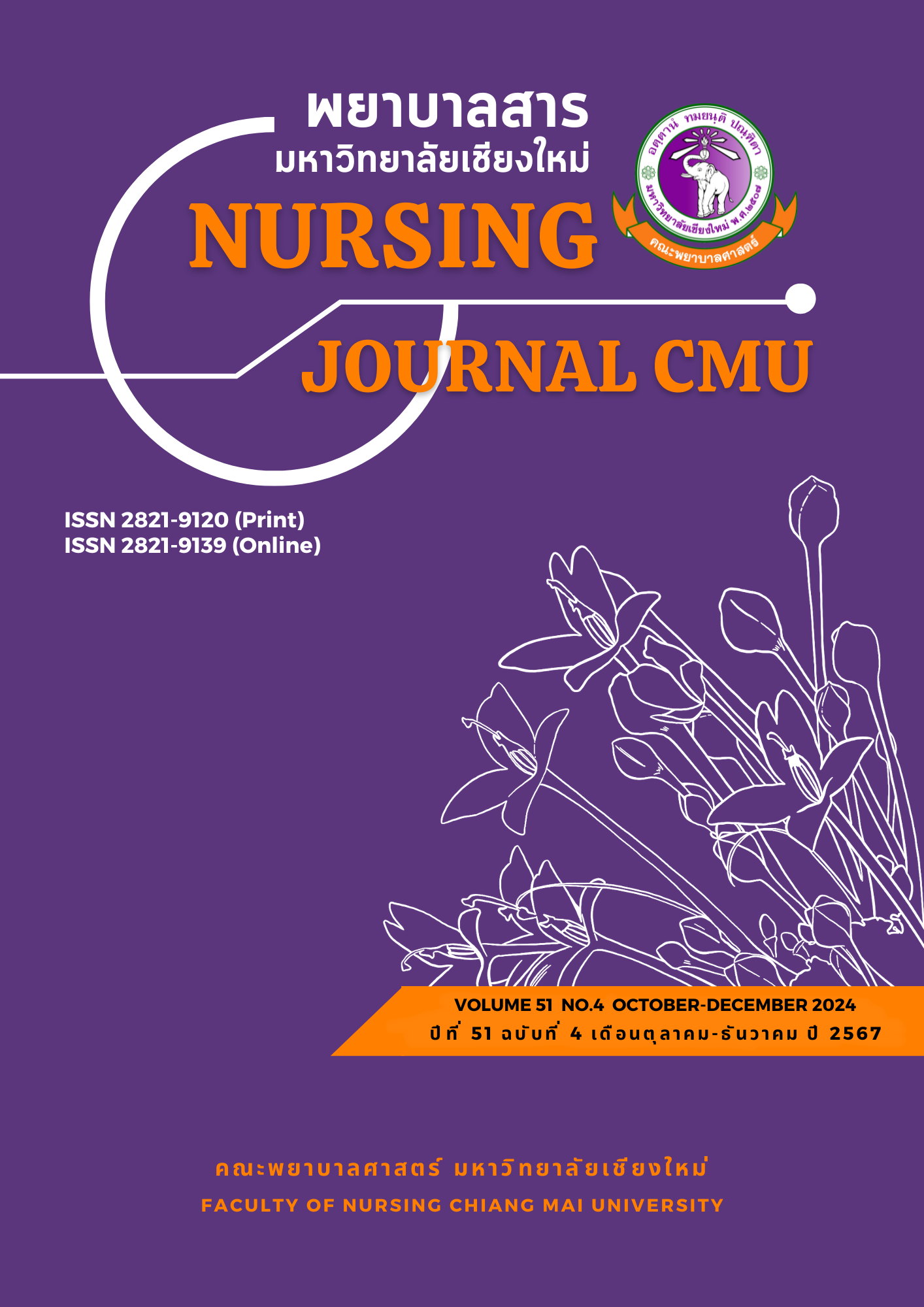Effect of a Nurses’ Self-Efficacy Enhancement Program on Screening and Stimulating Development of Early-stage Children with Developmental Problems at a Sub-District Health Promoting Hospital in Nakhon Sawan Province
Keywords:
Developmental stimulation, Screening, Self-efficacy, Children in early childhood, Sub-district health promoting hospitalAbstract
The self-efficacy of nurses in assessing and screening child development may help them accurately screen and stimulate children's development. This quasi-experimental one-group pretest-posttest research design aimed to study the effects of a nurses’ self-efficacy enhancement program on screening and stimulating development of early-stage children using the Thai Early Developmental Assessment for Intervention (TEDA4I) assessment guide for early-stage children with developmental problems. The sample consisted of 40 nurses who participated in a three-session self-efficacy enhancement program. Data were collected using a self-efficacy assessment tool designed for screening and stimulating early childhood development, based on the TEDA4I assessment guide for early-stage children with developmental problems. The tool was validated with an Index of Item-Objective Congruence (IOC) of .89 and demonstrated high reliability with a Cronbach’s alpha coefficient of .99. Data were analyzed using descriptive statistics and a paired t-test.
The results indicated that after participating in the self-efficacy enhancement program, the nurses had significantly higher average scores (M = 85.45, SD = 9.30) than before the program (M = 71.98, SD = 12.59, t = 6.007, p < 0.01).
The self-efficacy enhancement program could enhance nurses’ self-efficacy in screening and stimulating child development with the TEDA4I, reflected by the higher average scores, which is likely to improve the effectiveness of developmental screening and stimulation in early childhood.
References
Bandura, A. (1997). Self-efficacy: The exercise of control. W.H. Freeman.
Boonmuang, N. (2021). Effectiveness of the use of ventilator training program among nurses at Thungsong Hospital in Nakhon Si Thammarat Province. Thai Journal of Nursing, 70(2), 19–26. (in Thai)
Department of Mental Health, Ministry of Public Health. (2020). Thai early developmental assessment for intervention: TEDA4I. https://dmh-elibrary.org/items/show/262 (in Thai)
Health Data Center, Ministry of Public Health. (2023). Children develop delays that are stimulated by the TEDA4I criteria and are diagnosed with the disease. https://hdcservice.moph.go.th/hdc/reports/report.php?cat_id=1ed90bc32310b503b7ca9b32af425ae5&id=8b1344d910043725179665c82c9d38d3 (in Thai)
Kurnia, T. A., Trisyani, Y., & Prawesti, A. (2019). Factors associated with nurses’ self-efficacy in applying palliative care in intensive care unit. Jurnal Ners, 13(2), 219-226. https://doi.org/10.20473/jn.v13i2.9986
Langumong, N., & Wongchum, R. (2022). Effect of a participatory learning program on the knowledge and skills of practical roles among village health volunteers in Pratupa Subdistrict, Muang, Lamphun. Thai Red Cross Nursing Journal, 15(3), 135-150. (in Thai)
Leelawongkij, A. (2020). Effects of TEDA4I program on 0-5 years old children with developmental delays in Udonthani Province. Udonthani Hospital Medical Journal, 28(1), 101-111 (in Thai)
Makaraphirom, A., & Karawanih, A. (2015). The effects of the end of life care program on nurse’ self-efficacy and holistic care for end of life patients. The Journal of Prapokklao Hospital Clinical Medical Education Center, 32(4), 348-363. (in Thai)
Munluan, K., & Chaihan, N. (2023). The relationship between knowledge, attitudes, and self-efficacy in promoting living wills of professional nurses working in an intensive care unit. Nursing Journal CMU, 50(2), 144-157. (in Thai)
Patcheep, N., Chaiaree, W., & Chueathong, N. (2023). The effects of competencies promotion program fortriaging fast tract disease groups on knowledge and perceived self-efficacy of nurses, 19th Somdet Phra Sangkharat Hospital. The Academic and Nursing Journal of Boromarajonani College of Nursing, Chakriraj, 3(2), E000552. (in Thai)
Pengpist, K., & Khunlan Theunnadee, S. (2017). Effects of promoting perceived self-efficacy program on perceived self-efficacy and behavior of nurses to prevent ventilator-associated pneumonia. Journal of Nursing Science & Health, 40(2), 1-10. (in Thai)
Phamornpon, S., Nooyam, B., & Kanjanasilp, P. (2021). Effect of self-efficacy-promoting programme on self-care ability of person with stoma. The Journal of Thailand Nursing and Midwifery Council, 36(1), 52-70. (in Thai)
Phuphirom, W., Chuaykarn, U., & Jantawee, N. (2018). Effects of the self-efficacy enhancement program on registered nurses’ competencies in blood culture techniques and reducing blood culture contaminate rates. Region 11 Medical Journal, 32(3), 1189–1198. (in Thai)
Pongboriboon, U. (2018). Being the preceptor: The challenge of nurse’s self-efficacy. Journal of The Royal Thai Army Nurses, 19(Suppl.), 22-30. (in Thai)
Pramoj Na Ayutthaya, P., Monkong, S., & Intarasomba, P. (2011). The effect of a supportive educational end-of-life care program on knowledge and perceived self-efficacy of professional nurses. Ramathibodi Nursing Journal, 17(1), 141-156. (in Thai)
Punyoo, J., Jongaramraung, J., Daramas, T., Buadong, D., Singhasai, L., Tunksakool, J., Saehoong, S., Panjatharakul, P., & Thungkaeorungrueang, A. (2021). Factors related to perceived self-efficacy for COVID-19 prevention in pediatric nursing staff. Ramathibodi Nursing Journal, 27(3), 415-429. (in Thai)
Saudagar, S., Rambod, M., & Beheshtipour, N. (2015). Factors associated with nurses' self-efficacy in clinical setting in Iran, 2013. Iranian Journal of Nursing and Midwifery Research, 20(2), 226-231.
Sutthithumthaworn, A. (2022). Effectiveness of developmental promotion model for children with developmental delay. Regional Health Promotion Center 9 Journal, 16(3), 986-998. (in Thai)
Tongphuak, P., & Raungsung, P. (2024). The effect of a self-efficacy promoting program focused on spousal support on contraceptive use among adolescent mothers in the community. Journal of Health Sciences and Pedagogy, 4(2), 87-99. (in Thai)
Uttama, J., Kantawang, S., & Mesukho, J. (2016). Effects of educational program on nurses’ knowledge and self-efficacy in caring for leukemic children with chemotherapy-induced fatigue. Nursing Journal, 43(3), 1-12. (in Thai)
Downloads
Published
How to Cite
Issue
Section
License
Copyright (c) 2024 Nursing Journal CMU

This work is licensed under a Creative Commons Attribution-NonCommercial-NoDerivatives 4.0 International License.
บทความที่ได้รับการตีพิมพ์เป็นลิขสิทธิ์ของวารสารพยาบาลสาร
ข้อความที่ปรากฏในบทความแต่ละเรื่องในวารสารวิชาการเล่มนี้เป็นความคิดเห็นส่วนตัวของผู้เขียนแต่ละท่านไม่เกี่ยวข้องกับมหาวิทยาลัยเชียงใหม่ และคณาจารย์ท่านอื่นๆในมหาวิทยาลัยฯ แต่อย่างใด ความรับผิดชอบองค์ประกอบทั้งหมดของบทความแต่ละเรื่องเป็นของผู้เขียนแต่ละท่าน หากมีความผิดพลาดใด ๆ ผู้เขียนแต่ละท่านจะรับผิดชอบบทความของตนเองแต่ผู้เดียว






